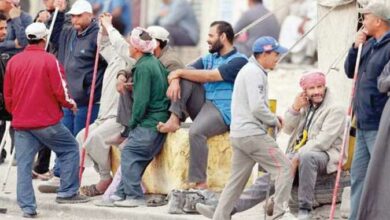Workers strikes, death sentences, murders, new ministries, and Farouk Hosni. These were just a few of the top stories of 2009 according to an annual report released yesterday by the cabinet’s Information and Decision Support Center.
The book reviews the 23 most important government decisions of the past year. At the top of the list was the decision to separate the Ministry of Housing and Health and the appointment of Mushira Khattab as housing minister. The government also revoked over the past year 422 decisions that had been adopted more than 50 years ago. The decision to turn the city of Luxor into a governorate was also noted as one of the year’s most important.
The book mentioned ten draft resolutions and bills approved by the parliament during the year, including one that granted the president the legal authorization to buy and sell weapons for the armed forces, and another that instituted a quota on women in parliament.
But the report did not limit itself to governmental proceedings. The past year also saw the death sentence of 24 defendants–the first of its kind–in the case widely known as "Wadi el-Natroun’s carnage," in which 11 people were killed in a dispute over land ownership. Death sentences were also issued for the murderers of the daughter of Moroccan singer Laila Ghufra, Heba, and her friend Nadin in 6th of October City. Another death sentence was issued in the case of an engineer who killed his wife and children after losing money in the stock market.
The July murder of Egyptian national Marwa el-Sherbini in Dresden, Germany also occupied much space in the report. The German extremist who killed el-Sherbini was sentenced to 15 years in prison.6
The book also chronicles a number of other controversies, including Culture Minister Farouk Hosni’s failed bid for the top position at the United Nations cultural organization, and the release of Ghad Party head and opposition leader Ayman Nour from jail.
The past year also witnessed a dispute between two prominent daughters. Huda Abdel Nasser, daughter of former president Gamal, was sued for LE50,000 by Ruqayia Sadat, daughter of former president Anwar. Huda Abdel Nasser had accused President Sadat of treason, espionage, and the murder of her father, for which she, in turn, was charged with slander.
2009 will also be remembered as a year of protests and strikes, with approximately 100 across the country, according to the report. These included strikes at factories including the Abu Zaabal glass factory, Telemasr, Nile Cotton factory, as well as protests by pharmacists, microbus drivers, lawyers, physical medicine graduates, train engineers, land reclamation companies, journalists, and parents of the students at Ramses Language School.
Twenty-nine prominent personalities passed away in 2009, the report said, including journalist Mohamed el-Sayyid el-Said, scientist Abdel Azim Anis, novelist Youssef Abu Rayya, author Mahmoud Awad, and prominent intellectual Mustafa Mahmoud.
A number of politicians also died over the year, such as former Interior Minister Nabawy Ismail, former Cairo Governor and member of the Free Officers Ibrahim el-Baghdady, former Defense Minister and head of secret services Amin Huwediy.
But Egyptians were most touched by the passing of the president’s 12-year-old grandson Mohamed in May and the death of Princess Farial, the oldest daughter of King Farouq.
Translated from the Arabic Edition.




